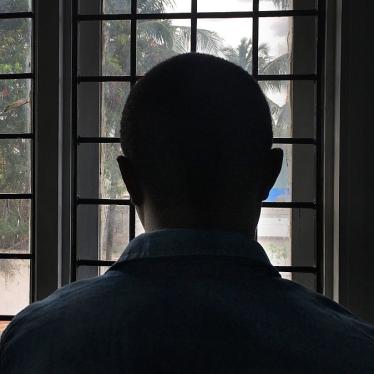The Burundian government's decision to criminalize homosexual conduct violates fundamental human rights and should be reversed immediately, Human Rights Watch and 62 other Burundian, African, and international human rights organizations said in a joint statement issued today. The statement came after President Pierre Nkurunziza secretly signed the legislation on April 22.
In February, the Senate voted overwhelmingly to reject a November 2008 decision by the National Assembly to criminalize same-sex relations. However, under the Burundian constitution, the National Assembly prevails in cases of conflict between the two houses of Parliament.
President Nkurunziza rejected calls by international diplomats to ask Parliament to revise the article in question. Nkurunziza had previously demonstrated his hostility to the rights of lesbian, gay, bisexual, and transgender (LGBT) people by making a statement on television in January that homosexuality was a "curse." Although he signed the legislation on April 22, four high-ranking police and Ministry of Justice officials contacted by Human Rights Watch on April 24 were not yet aware that the law had been promulgated, raising questions about the procedure followed.
"Burundi has taken a disappointing step backward by legalizing discrimination," said Scott Long, director of the Lesbian, Gay, Bisexual and Transgender Rights Program at Human Rights Watch. "The government has fallen back on ‘custom' and ‘culture' to justify this repressive step - but there can be no justification for stripping some of Burundi's people of their fundamental rights."
While the bill was under review in Parliament, the president's staff made calls to a number of legislators, attempting to influence their votes in favor of the measure. The president's party, CNDD-FDD, staged a mass protest on March 12 calling for the criminalization of homosexual conduct, bussing in schoolchildren and adults from rural provinces, many of whom, according to journalists present at the event, had no understanding of what they were protesting.
The law's Article 567, which penalizes consensual same-sex sexual relations by adults with up to two years in prison, violates the rights to privacy and freedom from discrimination. These rights are protected by Burundi's Constitution and enshrined in its international treaty commitments, notably the International Covenant on Civil and Political Rights, the African Charter on Human and Peoples' Rights, and the Universal Declaration of Human Rights. The organizations further expressed concern that the law will hamper Burundi's efforts to fight AIDS. The 2001 UN Declaration of Commitment on HIV/AIDS recognizes that discrimination against vulnerable groups undermines public health responses to HIV/AIDS.
According to the United Nations Working Group on Arbitrary Detention, arrests on the basis of sexual orientation are, by definition, human rights violations. The 63 organizations pledged to monitor carefully any arrests made on the basis of the law.
"The government claims to support human rights, but has passed a law that not only violates the right to privacy, but also discriminates against a group of citizens who have been recognized as vulnerable to HIV/AIDS," said David Nahimana, president of the Burundian human rights organization Ligue Iteka, one of the signatories to the statement. "These aspects of the Penal Code should be revised immediately."
Burundian and international human rights organizations, including those defending the rights of lesbian, gay, bisexual, and transgender persons have campaigned against the criminalization of homosexual conduct in Burundi since November 2008, when the National Assembly passed a draft revision of the criminal code that would criminalize homosexual conduct for the first time in Burundi's history.
"The state is sending the wrong message to its citizens: that they can now persecute people of a different sexual orientation," said Cary Alan Johnson, executive director of the International Gay and Lesbian Human Rights Commission (IGLHRC). "This is a regressive and unfortunate step."
The statement's signatories said that the Government of Burundi should promptly repeal the provision in question, Article 567 of the Penal Code.






